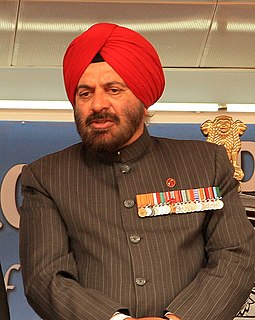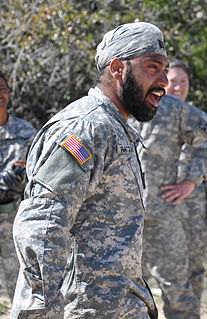
Sardar spelled as Sirdar, Sardaar, Shordar or Serdar, is a title of royal and nobility that was originally used to denote princes, noblemen, kings and other aristocrats. It has also been used to denote a chief or leader of a tribe or group. It is used as a Persian synonym of the title Emir of Arabic origin.

Field Marshal Sam Hormusji Framji Jamshedji Manekshaw, widely known as Sam Manekshaw and Sam Bahadur, was the Chief of the Army Staff of the Indian Army during the Indo-Pakistani War of 1971, and the first Indian Army officer to be promoted to the rank of field marshal. His active military career spanned four decades and five wars, beginning with service in the British Indian Army in World War II.

Bhagat Singh Thind was an Indian American writer and lecturer on spirituality who served in the United States Army during World War I and was involved in a Supreme Court case over the right of Indian people to obtain United States citizenship.

Udham Singh was an Indian revolutionary belonging to Ghadar Party and HSRA, best known for assassinating Michael O'Dwyer, the former lieutenant governor of the Punjab in India, on 13 March 1940. The assassination was done in revenge for the Jallianwala Bagh massacre in Amritsar in 1919, for which O'Dwyer was responsible. Singh was subsequently tried and convicted of murder and hanged in July 1940. While in custody, he used the name Ram Mohammad Singh Azad, which represents the three major religions in India and his anti-colonial sentiment.

The Rashtriya Indian Military College (RIMC) is a military school for boys and girls situated in Doon Valley, Dehradun in India. The RIMC is a feeder institution for the National Defence Academy, Indian Naval Academy and subsequently the Indian Armed Forces. Rimcollians, the name by which alumni of the RIMC are usually denoted, have gone on to hold the highest ranks in the Army, Navy and the Air Force of India, Pakistan and Bangladesh. Col Ajay Kumar is the current Commandant of the RIMC.
Indian Army Ranks can be broadly classified into three categories: Commissioned Officers, Junior Commissioned Officers and Other Ranks.

General Joginder Jaswant Singh, PVSM, AVSM, VSM, ADC is an Indian politician and former Army Chief. He was the 21st Chief of the Army Staff (COAS) of the Indian Army. He was appointed on 27 November 2004, and took over the role when his predecessor, General N C Vij, retired on 31 January 2005. He was succeeded by General Deepak Kapoor. He served as the COAS from 31 January 2005, to 30 September 2007.

Lt. Col, Brig. (Hon.), Maharaja Sawai Bhawani Singh MVC was an Indian Army officer and a entrepreneur.
S. Sadhu Singh Thind is an Indian scholar and politician, most notable for serving the longest term as President of the District Congress Committee, Kapurthala, Punjab. He also served as an MLA from Sultanpur Lodhi. While serving as MLA, he was noted for repatriating the remains of Udham Singh from England to India in 1974.

Lieutenant General Sagat Singh Rathore, PVSM was a General Officer in the Indian Army notable for his participation in liberation of Goa and later in Bangladesh. He held many commands and staff appointments throughout his military career.
Raja Sir Harnam Singh Ahluwalia , KCIE was a member of the Kapurthala royal family in the direct line founded by Jassa Singh Ahluwalia.

Lieutenant General Harbaksh Singh, VrC was a senior General Officer in the Indian Army. As the Western Army Commander, Singh commanded the Indian Army forces and played a key role during the Indo-Pakistani War of 1965. For his role in the war, he was awarded the Padma Vibhushan in 1966.
Kartar Singh Thind was a scientist of botanical sciences. He was born on in village Saidpur, Tehsil Sultanpur Lodhi, District Kapurthala, Punjab, India ,in a Thind clan of Kamboj family.

Kapurthala State, with its capital at Kapurthala, was a former Princely state of Punjab. Ruled by Aujla Jats rulers, spread across 352 square miles (910 km2). According to the 1901 census the state had a population of 314,341 and contained two towns and 167 villages. In 1930, Kapurthala became part of the Punjab States Agency and acceded to the Union of India in 1947.

Bharatpur State, which is also known as the Jat State of Bharatpur historically known as the Kingdom of Bharatpur, was a Hindu Kingdom in the northern Indian subcontinent. It was ruled by the Sinsinwar clan of the Hindu Jats. At the time of reign of king Suraj Mal (1755–1763) revenue of the state was 17,500,000 rupees per annual.
Raja Rao Birender Singh was a King of erstwhile state of Haryana and an Indian politician. He served first as a minister in the state government of Punjab and then as Chief Minister of Haryana from 24 March 1967 - 2 November 1967, and also served as a minister in Punjab state, Haryana state and the Union cabinet. He also served as the second speaker of Haryana state assembly in 1967. He coined an Indian political vocabulary Aya Ram, Gaya Ram to describe the practice of frequently floor-crossing by legislature.

There have been Sikhs in the United States military since World War I. Sikhs and Sikh Americans have served through all subsequent wars until the present day. Since the 1980s, observant Sikhs have faced difficulty in serving due to a discontinuation of exemptions to uniform standards which previously allowed Sikhs to maintain their religiously-mandated beards and turbans while in uniform.
Saidpur is a village in Sultanpur Lodhi Tehsil, Kapurthala district, Punjab, India, situated in the footsteps of Margalla Hills hardly at five minutes drive from the upscale neighbourhoods of the capital.

Udaipur State was one of the princely states of India during the period of the British Raj. The town of Dharamjaigarh was the former state's capital.

Brigadier Farzand-i-Dilband Rasikh-al-Iqtidad-i-Daulat-i-Inglishia, Raja-i-Rajagan, Maharaja Sukhjit Singh Bahadur, Maharaja of Kapurthala , MVC is a former Indian Army officer who served with The Scinde Horse. He was awarded the Maha Vir Chakra, India's second highest award for gallantry, for his leadership and courage in facing the enemy during the Battle of Basantar in the Indo-Pakistani War of 1971.













